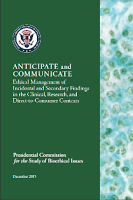by the staff of the Presidential Commission for the Study of Bioethical Issues
This piece, which originally appeared on the blog of the Presidential Commission for the Study of Bioethical Issues, has been reposted with permission.
 We all need to know how to better manage health information that we did not expect. Today, the Presidential Commission for the Study of Bioethical Issues (Bioethics Commission) released its report Anticipate and Communicate: Ethical Management of Incidental and Secondary Findings in the Clinical, Research, and Direct-to-Consumer Contexts. Commission Chair Amy Gutmann, PhD, discussed the report in a Policy Forum piece published today in Science.
We all need to know how to better manage health information that we did not expect. Today, the Presidential Commission for the Study of Bioethical Issues (Bioethics Commission) released its report Anticipate and Communicate: Ethical Management of Incidental and Secondary Findings in the Clinical, Research, and Direct-to-Consumer Contexts. Commission Chair Amy Gutmann, PhD, discussed the report in a Policy Forum piece published today in Science.
No one is immune from the prospect of discovering something unexpected when undergoing a routine test at the doctor’s office, participating in research, or even submitting a cheek swab to a direct-to-consumer (DTC) company for analysis. Regardless of the setting or the test or procedure, when it comes to incidental findings, the Bioethics Commission offered this piece of overarching advice: anticipate and communicate. The Bioethics Commission recommended that all practitioners anticipate and plan for incidental findings so that patients, research participants, and consumers are informed ahead of time about what to expect.
Incidental findings, traditionally defined as results that arise outside the purpose for which a test or procedure was originally conducted, give rise to a range of practical and ethical challenges for recipients and practitioners. Secondary findings, like incidental findings, are not the primary target of a test or procedure but are actively sought in the process of testing. Incidental and secondary findings can be lifesaving if their discovery leads to treatment that would not otherwise have been possible, but also can lead to uncertainty and distress with no corresponding benefit if they identify conditions for which no effective treatment is available.
The Bioethics Commission concluded that certain actions should be taken regardless of where incidental or secondary findings arise, and made five recommendations intended to apply across contexts. The first overarching recommendation aimed to ensure that individuals are informed about the possibility of incidental and secondary findings before they are tested, and of any plan for disclosing and managing these findings. Because of the fundamental importance of informing potential recipients—including respect for recipient autonomy, beneficence, and informed decision making—the recommendation was further specified and applied in the clinical, research, and DTC contexts.
The Bioethics Commission also recognized the importance of developing an evidence base to inform decisions about how best to manage incidental and secondary findings. In its second overarching recommendation, the Bioethics Commission called on professional groups to develop guidelines to categorize the findings likely to arise from each diagnostic modality and develop best practices for managing these findings. The third recommendation called for research about the types and frequency of incidental and secondary findings; the costs, benefits, and harms associated with these findings; and recipient and practitioner preferences with regard to these findings.
Informing individuals works best when those involved—both practitioners and potential recipients—are informed about the consequences of incidental and secondary findings. Accordingly, in its fourth recommendation, the Bioethics Commission called for the preparation of educational materials to inform all stakeholders—including practitioners, institutional review boards, and potential recipients—about the ethical, practical, and legal implications of incidental and secondary findings.
Finally, the Bioethics Commission recognized that existing disparities could lead to inequitable access to the counseling and care needed to appropriately manage incidental and secondary findings. In its fifth recommendation, the Bioethics Commission noted that the principle of justice and fairness requires affordable access to quality information, both before and after testing, about incidental and secondary findings that could arise.
These overarching recommendations are supplemented by recommendations specific to the clinical, research, and DTC contexts that will be described in subsequent posts on the Bioethics Commission’s blog.

No comments! Be the first commenter?